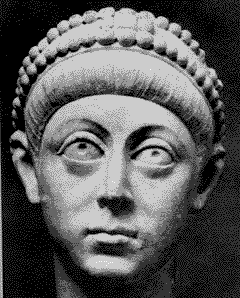 Contents -
Previous Article -
Next Article
Contents -
Previous Article -
Next Article
An Increasingly Remote and Deified Emperor In its early beginnings, the Roman state was governed under an arrangement known as the Republic. Because of abuses under some early kings known as the Tarquins, the Roman people had historically abhorred any form of monarchy or its trappings. To have a king ruling over him was absolutely unthinkable to the average Roman citizen.
During the First Century B. C., powerful generals often gained absolute power, or shared power with two other men in an arrangement called a triumvirate. Though their power was almost absolute, they would never dream of calling themselves "Lord" or "King" unless they wanted to risk being murdered by irate citizens with strong Republican sentiment.
When Octavian was granted sweeping powers and the title of Augustus by the Senate in 27 B. C., he became Rome’s first emperor. Even then, Octavian took great pains to avoid all appearances of royalty, even offering to resign into private life after he had brought an end to the civil wars. He preferred the title "Augustus' or "Princeps", which means simply, "First Citizen".
Subsequent emperors during the First and Second Centuries were wise to follow Augustus' example and downplay any association with kings and royalty, though the power of the emperors was becoming more and more absolute. The Senate, originally the body of ruling men in Rome, had less and less political power as time went on and was becoming a social organization for members of the rich Patrician families.
In A. D. 284, Diocletian ascended the throne and implemented major reforms in the government. One of the most serious problems of previous reigns was that, since the emperor was supposedly just "First Citizen", army officers and private citizens had little trouble getting close to him. Also, the people believed that there was nothing intrinsically special about the emperor and that he was just like any other man. This condition permitted almost anyone who was quick enough with a sword or a dagger to get in close to the emperor quickly and assassinate him. Furthermore, murdering an emperor would just be simply murder and not an act of sacrilege, which the Romans considered to be a much more heinous crime than ordinary murder. Diocletian made two major changes in the way the imperial persona was projected that largely, but not completely, put a stop to the knife and dagger shenanigans that had plagued previous reigns.
First, he changed the title of the emperor from "Princeps" or "Augustus" to "Dominus", which means "Lord". Not only does this title signify that the emperor had absolute power and authority, but it demonstrated how the personal freedoms of the average Roman citizen had eroded over the centuries. The title "Dominus" had always been used by a slave addressing his master. Now, it was used by a Roman citizen addressing his emperor. The actual situation had gradually become just as the change in terminology suggests. The once proud Roman citizen with many civic freedoms now occupied a position little better than a slave, if he or she were of the lower classes. The poor COLONI, or small farmers, could not even leave the land on which they were born and had to marry a girl whose father was also a farmer tied to the soil. Coin legends during the period showing the emperor's name often begin with the letters DN, an abbreviation of the Latin words DOMINI NOSTER, translating "Our Lord". The picture displayed with this topic clearly shows this where the emperor's titles begin near the left side of the bust. Another thing Diocletian did was to associate the emperor with one or more of the ancient gods, either claiming descent from or special protection under the deity. Diocletian associated himself and Maximianus with Jupiter, while Galerius and Maximinus II were the "Herculean" emperors. Constantine was associated with SOLI INVICTUS (The Invincible Sun) before he became a Christian and put himself under the protection of Christ, the Son of God. Though we would consider it to be sacrilege today, even the devoutly Christian emperors were still referred to as "The Divine Theodosius", or, "His Divine Majesty Valentinian". Because of this quasi god-like character of the emperor's persona, citizens only rarely got an audience (referred to as a "silence" out of obsequious respect) with the emperor. He surrounded himself with powerful ministers and bodyguards and rarely mingled with the people. While this afforded him a degree of protection, it also set up a situation where an emperor was very dependent on his privy council for information of the outside world or his popularity with the people. Some weal emperors like Honorius and Valentinian III were controlled entirely by their Lord Chamberlain or Masters of the Soldiers. This character of the imperial office was to continue and become ever more extreme right up until the fall of the West and on into the Byzantine period for another thousand years.
Go to next article:
Go back to previous article: